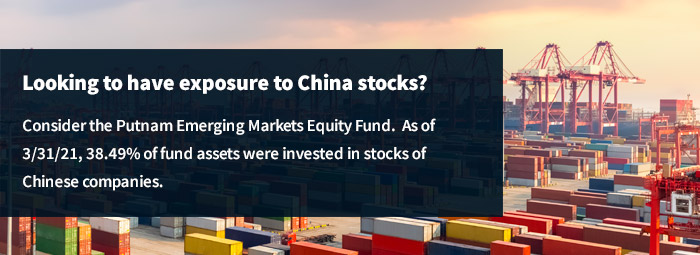China’s technology sector has cratered since February. As represented by KWEB (KraneShares CSI China Internet ETF), China tech plunged 29% from its high on February 17, underperforming the MSCI Emerging Markets Index by 22% and Nasdaq by 30% as of April 20, 2021. As China tech accounts for nearly 20% of the benchmark, this explains much of the recent underperformance of emerging markets (EM) versus developed markets (DM).
We view the sell-off as a buying opportunity: EPS (earnings per share) estimates have been reset, sentiment is at all-time lows, and valuations are extremely attractive.
China’s regulatory actions
Negative headlines have surrounded China’s tech industry since the cancellation of the Ant Group IPO in late 2020, but we have seen this story before. The proposed regulatory measures are expected to have an impact, but not sink the medium-term profit outlook for the benchmark heavyweights — Alibaba, Tencent, Meituan, JD.com, and Baidu.
We believe the conclusion of the anti-trust investigation (of Alibaba), in spite of a record $2.8B fine, is a positive catalyst by resolving the matter. It is a clear sign that China’s government intends to deliver a lesson, but not to impede the company’s ability to be a profitable, value-creating entity. The $2.8B amount is less than 0.5% of Alibaba’s market cap. This was a much better-than-expected outcome, and it sent shares up 8% on the day of the announcement.
Despite the scrutiny on potential monopolistic behaviors, we should not be distracted from the huge improvements these Chinese tech companies have made and will continue to make on the lives of Chinese consumers.
Alibaba distances from Jack Ma
We think it is important to note a distinction between Alibaba and Jack Ma. We believe that Jack Ma was a target for his political comments, and Alibaba was caught in the fallout. That said, Jack Ma no longer works at Alibaba, is not a member of the board, and owns just a 4% stake in the company.
Targeting Ant Financial was a more effective move for the government as Ma controls 50% of that entity, and it accounts for a much higher percentage of his theoretical wealth. Alibaba’s stake in Ant could now be valued at under $35B, or less than 5% of Alibaba’s market cap — an immaterial amount.
Not a China problem
In my view, the issue is not a China tech issue but a big tech issue globally. The actions taken against U.S. multinationals are no different. For example, Google has been fined nearly $9B by the European Union. The FTC has initiated a lawsuit to break up Facebook. In July, members of Congress skewered Amazon’s Jeff Bezos. Quotes from the hearing described Amazon as using its dominant market position to unfairly harm competition.
The market power of these companies is a big tech issue, not a China tech issue.
China tech stocks: Positive outlook
We have become more bullish on the outlook for China tech companies, which are leading the world with innovations in mobile payments, online to offline services, on-demand-delivery, gaming, and more. Based on 2025 estimates, e-commerce leaders JD.com and Alibaba are now trading at 11x EPS. This valuation implies over 100% upside on a 3-year view.
Let’s consider a comparison to Amazon, which is a very attractively priced company that we believe can double on a 5-year view. It produces $26B in free cash flow and has a market cap of $1.7T. The market caps of Tencent, Alibaba, JD.com, and Baidu sum to $1.6T. Together, they are expected to produce $44B of free cash flow — 70% more.
Numbers alone don’t tell the story. Alibaba sells more goods than Amazon. Tencent has more than a billion customers who spend 2.5 hours a day on its platform. JD is a strong number two in e-commerce with diverse offerings in delivery and health care. Baidu, finally, is not only the leader in search but also the leader in AI patents globally.
While Amazon is likely to continue to be a winning stock, in our view, we are buyers of China tech companies, a universe which is trading at nearly a 50% discount. We are bullish on China tech stocks and view the pullback in EM equities more broadly as a buying opportunity.
As of March 31, 2021, in Putnam Emerging Markets Equity Fund, Alibaba represented 7.39% of the fund’s assets; Tencent, 8.66%; Meituan, 2.82%; JD.com, 2.96%; and Baidu, 1.43%. The fund did not hold Alphabet (Google), Facebook, or Amazon. As of March 31, 2021, 38.49% of fund assets were invested in stocks of Chinese companies.
BLOOMBERG® is a trademark and service mark of Bloomberg Finance L.P. and its affiliates (collectively “Bloomberg”). BARCLAYS® is a trademark and service mark of Barclays Bank Plc (collectively with its affiliates, “Barclays”), used under license. Bloomberg or Bloomberg’s licensors, including Barclays, own all proprietary rights in the Bloomberg Barclays Indices. Neither Bloomberg nor Barclays approves or endorses this material, or guarantees the accuracy or completeness of any information herein, or makes any warranty, express or limited, as to the results to be obtained therefrom, and to the maximum extent allowed by law, neither shall have any liability or responsibility for injury or damages arising in connection therewith.
325982
More in: Equity




